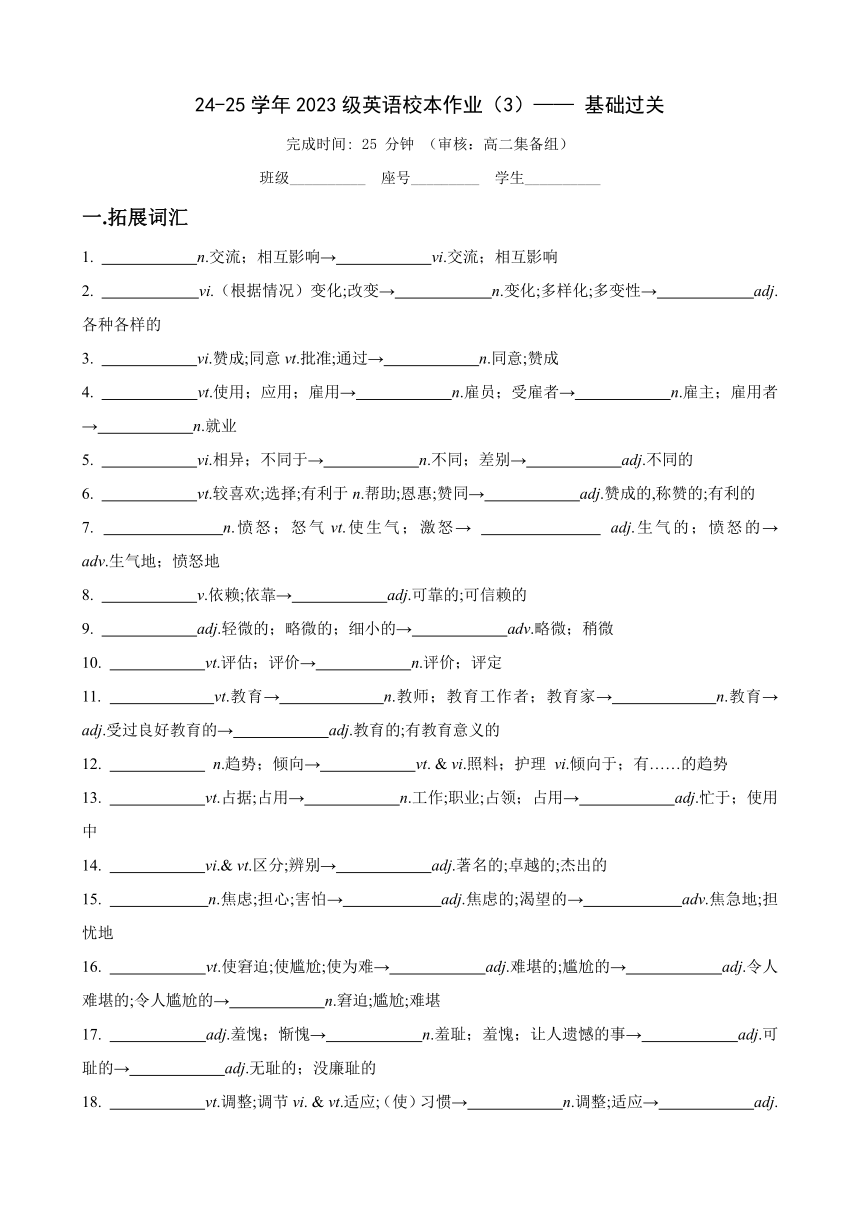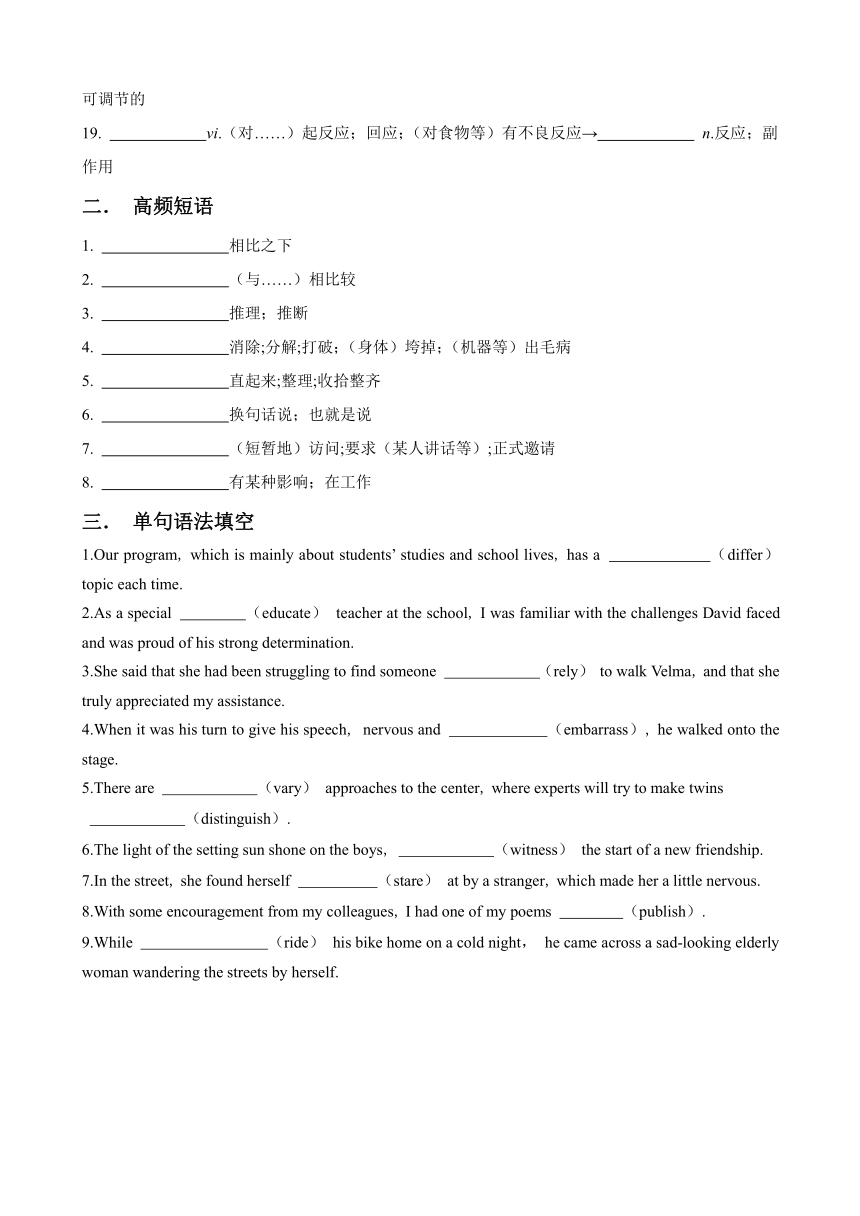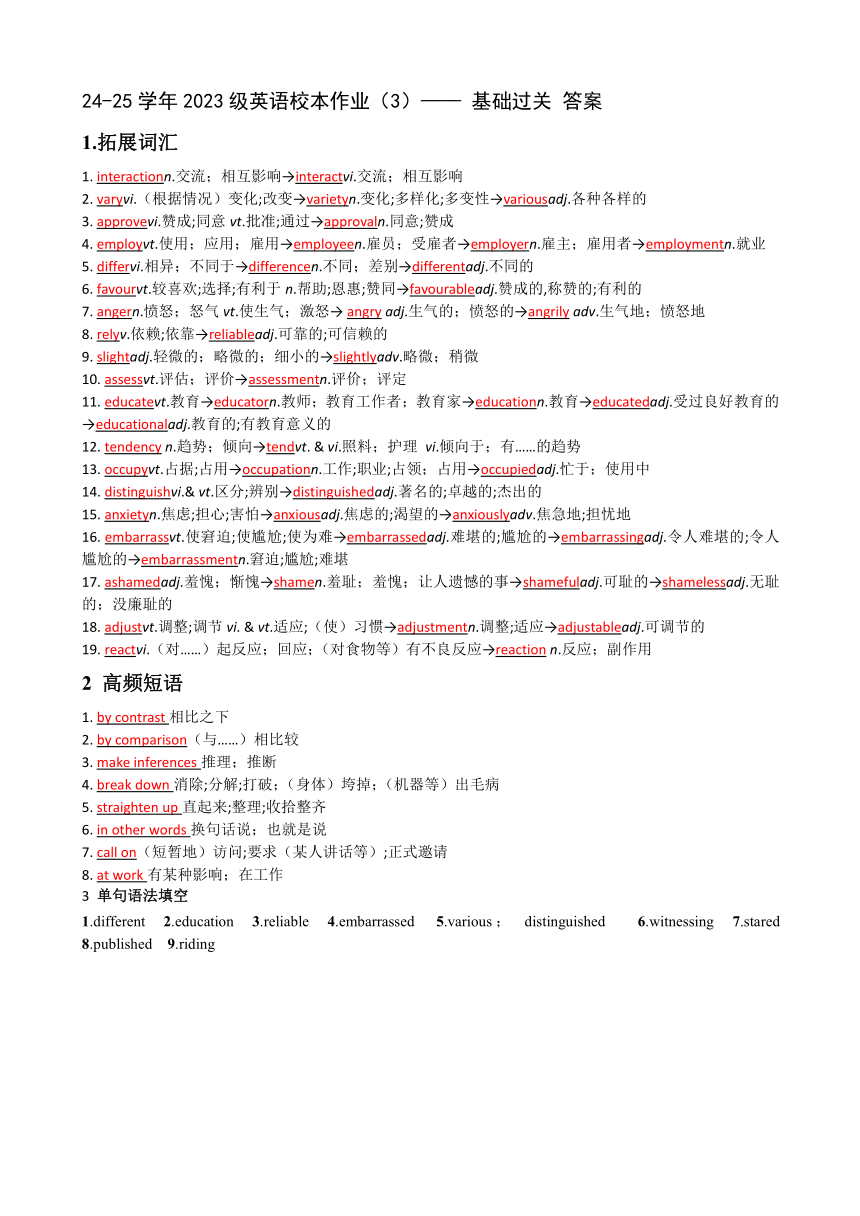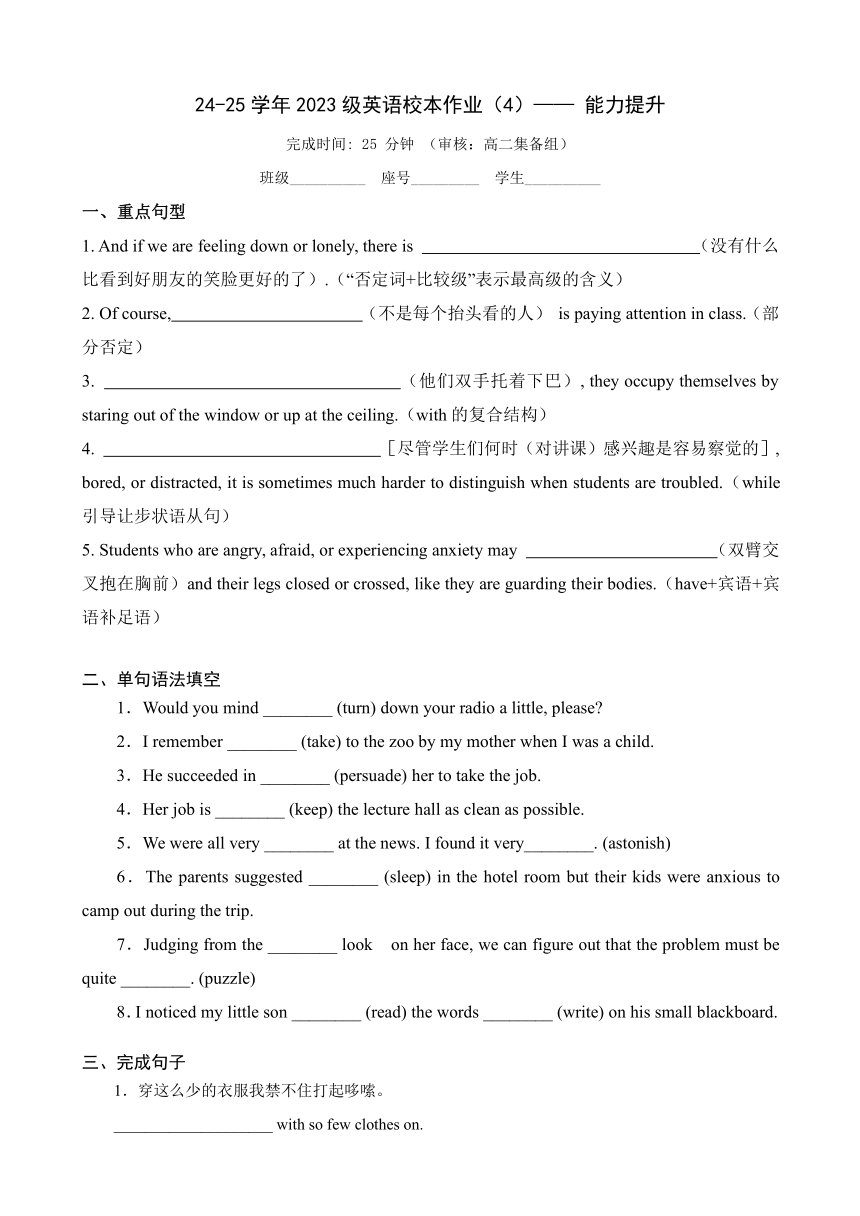人教版(2019)选择性必修第一册Unit 4 Body Language 基础过关检测+能力提升测(含答案)
文档属性
| 名称 | 人教版(2019)选择性必修第一册Unit 4 Body Language 基础过关检测+能力提升测(含答案) |

|
|
| 格式 | docx | ||
| 文件大小 | 33.5KB | ||
| 资源类型 | 教案 | ||
| 版本资源 | 人教版(2019) | ||
| 科目 | 英语 | ||
| 更新时间 | 2024-12-25 11:30:17 | ||
图片预览




文档简介
24-25学年2023级英语校本作业(3)—— 基础过关
完成时间: 25 分钟 (审核:高二集备组)
班级__________ 座号_________ 学生__________
一.拓展词汇
1. n.交流;相互影响→ vi.交流;相互影响
2. vi.(根据情况)变化;改变→ n.变化;多样化;多变性→ adj.各种各样的
3. vi.赞成;同意vt.批准;通过→ n.同意;赞成
4. vt.使用;应用;雇用→ n.雇员;受雇者→ n.雇主;雇用者→ n.就业
5. vi.相异;不同于→ n.不同;差别→ adj.不同的
6. vt.较喜欢;选择;有利于n.帮助;恩惠;赞同→ adj.赞成的,称赞的;有利的
7. n.愤怒;怒气vt.使生气;激怒→ adj.生气的;愤怒的→ adv.生气地;愤怒地
8. v.依赖;依靠→ adj.可靠的;可信赖的
9. adj.轻微的;略微的;细小的→ adv.略微;稍微
10. vt.评估;评价→ n.评价;评定
11. vt.教育→ n.教师;教育工作者;教育家→ n.教育→ adj.受过良好教育的→ adj.教育的;有教育意义的
12. n.趋势;倾向→ vt. & vi.照料;护理 vi.倾向于;有……的趋势
13. vt.占据;占用→ n.工作;职业;占领;占用→ adj.忙于;使用中
14. vi.& vt.区分;辨别→ adj.著名的;卓越的;杰出的
15. n.焦虑;担心;害怕→ adj.焦虑的;渴望的→ adv.焦急地;担忧地
16. vt.使窘迫;使尴尬;使为难→ adj.难堪的;尴尬的→ adj.令人难堪的;令人尴尬的→ n.窘迫;尴尬;难堪
17. adj.羞愧;惭愧→ n.羞耻;羞愧;让人遗憾的事→ adj.可耻的→ adj.无耻的;没廉耻的
18. vt.调整;调节vi. & vt.适应;(使)习惯→ n.调整;适应→ adj.可调节的
19. vi.(对……)起反应;回应;(对食物等)有不良反应→ n.反应;副作用
二. 高频短语
1. 相比之下
2. (与……)相比较
3. 推理;推断
4. 消除;分解;打破;(身体)垮掉;(机器等)出毛病
5. 直起来;整理;收拾整齐
6. 换句话说;也就是说
7. (短暂地)访问;要求(某人讲话等);正式邀请
8. 有某种影响;在工作
三. 单句语法填空
1.Our program, which is mainly about students’ studies and school lives, has a (differ) topic each time.
2.As a special (educate) teacher at the school, I was familiar with the challenges David faced and was proud of his strong determination.
3.She said that she had been struggling to find someone (rely) to walk Velma, and that she truly appreciated my assistance.
4.When it was his turn to give his speech, nervous and (embarrass), he walked onto the stage.
5.There are (vary) approaches to the center, where experts will try to make twins
(distinguish).
6.The light of the setting sun shone on the boys, (witness) the start of a new friendship.
7.In the street, she found herself (stare) at by a stranger, which made her a little nervous.
8.With some encouragement from my colleagues, I had one of my poems (publish).
9.While (ride) his bike home on a cold night, he came across a sad-looking elderly woman wandering the streets by herself.
24-25学年2023级英语校本作业(3)—— 基础过关 答案
1.拓展词汇
1. interactionn.交流;相互影响→interactvi.交流;相互影响
2. varyvi.(根据情况)变化;改变→varietyn.变化;多样化;多变性→variousadj.各种各样的
3. approvevi.赞成;同意vt.批准;通过→approvaln.同意;赞成
4. employvt.使用;应用;雇用→employeen.雇员;受雇者→employern.雇主;雇用者→employmentn.就业
5. differvi.相异;不同于→differencen.不同;差别→differentadj.不同的
6. favourvt.较喜欢;选择;有利于n.帮助;恩惠;赞同→favourableadj.赞成的,称赞的;有利的
7. angern.愤怒;怒气vt.使生气;激怒→ angry adj.生气的;愤怒的→angrily adv.生气地;愤怒地
8. relyv.依赖;依靠→reliableadj.可靠的;可信赖的
9. slightadj.轻微的;略微的;细小的→slightlyadv.略微;稍微
10. assessvt.评估;评价→assessmentn.评价;评定
11. educatevt.教育→educatorn.教师;教育工作者;教育家→educationn.教育→educatedadj.受过良好教育的→educationaladj.教育的;有教育意义的
12. tendency n.趋势;倾向→tendvt. & vi.照料;护理 vi.倾向于;有……的趋势
13. occupyvt.占据;占用→occupationn.工作;职业;占领;占用→occupiedadj.忙于;使用中
14. distinguishvi.& vt.区分;辨别→distinguishedadj.著名的;卓越的;杰出的
15. anxietyn.焦虑;担心;害怕→anxiousadj.焦虑的;渴望的→anxiouslyadv.焦急地;担忧地
16. embarrassvt.使窘迫;使尴尬;使为难→embarrassedadj.难堪的;尴尬的→embarrassingadj.令人难堪的;令人尴尬的→embarrassmentn.窘迫;尴尬;难堪
17. ashamedadj.羞愧;惭愧→shamen.羞耻;羞愧;让人遗憾的事→shamefuladj.可耻的→shamelessadj.无耻的;没廉耻的
18. adjustvt.调整;调节vi. & vt.适应;(使)习惯→adjustmentn.调整;适应→adjustableadj.可调节的
19. reactvi.(对……)起反应;回应;(对食物等)有不良反应→reaction n.反应;副作用
2 高频短语
1. by contrast相比之下
2. by comparison(与……)相比较
3. make inferences推理;推断
4. break down消除;分解;打破;(身体)垮掉;(机器等)出毛病
5. straighten up直起来;整理;收拾整齐
6. in other words换句话说;也就是说
7. call on(短暂地)访问;要求(某人讲话等);正式邀请
8. at work有某种影响;在工作
3 单句语法填空
1.different 2.education 3.reliable 4.embarrassed 5.various; distinguished 6.witnessing 7.stared 8.published 9.riding
24-25学年2023级英语校本作业(4)—— 能力提升
完成时间: 25 分钟 (审核:高二集备组)
班级__________ 座号_________ 学生__________
一、重点句型
1. And if we are feeling down or lonely, there is (没有什么比看到好朋友的笑脸更好的了).(“否定词+比较级”表示最高级的含义)
2. Of course, (不是每个抬头看的人) is paying attention in class.(部分否定)
3. (他们双手托着下巴), they occupy themselves by staring out of the window or up at the ceiling.(with的复合结构)
4. [尽管学生们何时(对讲课)感兴趣是容易察觉的], bored, or distracted, it is sometimes much harder to distinguish when students are troubled.(while引导让步状语从句)
5. Students who are angry, afraid, or experiencing anxiety may (双臂交叉抱在胸前)and their legs closed or crossed, like they are guarding their bodies.(have+宾语+宾语补足语)
二、单句语法填空
1.Would you mind ________ (turn) down your radio a little, please
2.I remember ________ (take) to the zoo by my mother when I was a child.
3.He succeeded in ________ (persuade) her to take the job.
4.Her job is ________ (keep) the lecture hall as clean as possible.
5.We were all very ________ at the news. I found it very________. (astonish)
6.The parents suggested ________ (sleep) in the hotel room but their kids were anxious to camp out during the trip.
7.Judging from the ________ look on her face, we can figure out that the problem must be quite ________. (puzzle)
8.I noticed my little son ________ (read) the words ________ (write) on his small blackboard.
三、完成句子
1.穿这么少的衣服我禁不住打起哆嗦。
____________________ with so few clothes on.
2.自从退休以来他就一直梦想着沿丝绸之路旅行。
He has been dreaming of ____________________ since he retired.
3.他将不断地试验新方法,以帮助全中国的农民。
He will keep ____________________ so that he can help farmers around China.
4.很多人都建议制定更多规则以保护动物权益。
Many people have suggested ____________________ to protect animal rights.
5.他的任务之一就是为爬山准备一些食物和饮用水。
One of his tasks ____________________ for the climbing.
四、单句写作
1.晚饭后你想和我一起出去散步吗?(feel like)
________________________________________________________________________
________________________________________________________________________
2.让事情更糟糕的是她缺席了那次会议。(doing作表语)
________________________________________________________________________
________________________________________________________________________
3.我很感激您帮助我克服如此多的困难。(be grateful to sb. for)
________________________________________________________________________
________________________________________________________________________
4.我期待在您方便的时候早日收到您的回复。 (look forward to)
________________________________________________________________________
________________________________________________________________________
5.幸运的是,我避免了被班主任惩罚。(avoid)
________________________________________________________________________
________________________________________________________________________
24-25学年2023级英语校本作业(4)—— 能力提升 答案
一、重点句型
1. And if we are feeling down or lonely, there is nothing better than seeing the smiling face of a good friend(没有什么比看到好朋友的笑脸更好的了).(“否定词+比较级”表示最高级的含义)
2. Of course,not everyone who looks up(不是每个抬头看的人) is paying attention in class.(部分否定)
3. With their chins on their hands(他们双手托着下巴), they occupy themselves by staring out of the window or up at the ceiling.(with的复合结构)
4. While it is easy to perceive when students are interested[尽管学生们何时(对讲课)感兴趣是容易察觉的], bored, or distracted, it is sometimes much harder to distinguish when students are troubled.(while引导让步状语从句)
5. Students who are angry, afraid, or experiencing anxiety may have their arms crossed in front of their chests(双臂交叉抱在胸前)and their legs closed or crossed, like they are guarding their bodies.(have+宾语+宾语补足语)
Ⅱ.
1.turning 2.being taken 3.persuading 4.keeping 5.astonished; astonishing 6.sleeping 7.puzzled; puzzling 8.reading; written
Ⅲ.
1.I couldn't help shaking 2.travelling along the Silk Road 3.trying out new ideas 4.setting up more rules 5.is preparing some food and drinking water
Ⅳ.
1.Do you feel like going out for a walk with me after supper
2.What made things worse was her being absent from the meeting.
3.I was grateful to you for helping me overcome so many difficulties.
4.I am looking forward to receiving your early reply at your earliest convenience.
5.Fortunately, I avoided being punished by my headteacher.
24-25学年2023级英语校本作业(5)—— 综合运用
完成时间: 15 分钟 (审核:高二集备组)
班级__________ 座号_________ 学生__________
阅读理解
A
How can you use your body to improve your speech
Before you can use your body effectively, you’ve got to start in the right state of mind.
If you want to deliver a calm speech your body has to convey calm; if you want to deliver an exciting speech you’ve got to be excited.A well prepared and warmed up voice and body create the whole message that you want to communicate.
How do you get into a good state of mind
There are different ways.Try carrying around notes with positive information on them.Have a message at the top of your notes that says “you’re fantastic” “brilliant” or “I love you”! And if you do have notes write “breathe” as a reminder.
Also, imagination can be very effective.Imagine what it’s going to be like; imagine the applause; imagine people nodding as you speak, coming up to you afterwards, tapping you on the shoulder and saying well done! All this helps.
What can people do to improve how they use their body
Eye contact with individual members of the audience is very important; take care to look around everyone, so that they all feel included.If you’re too nervous to look them in the eye, look at their forehead which will still make them feel involved.
Your feet need to be firmly and evenly placed on the ground because if you’re unbalanced it affects your breathing and will affect your projection.
What should you do with your hands when speaking
Let your gestures come naturally.You could start by letting your hands relax by your side unless you want to use them.Let them rest on a lectern(讲台) if there is one.If you have notes use one hand to hold them.Don’t put your hands in your pockets.
What else is important
It is essential to practice and fully warm up your speaking muscles.It’s said that Churchill said for every minute of a speech, you need to spend an hour practicing.And don’t just practice your words — practice your breathing, and exercise your tongue and your cheeks.
1.What can help us get into a good state of mind according to the text
A.Eye contact. B.Good questions.
C.Natural gestures. D.Positive messages.
2.A speaker should make eye contact with his audience to .
A.show that he is not nervous B.suggest that he is confident
C.make them feel they are important D.remind them to listen to him carefully
3.What message does the author want to convey by giving the example of Churchill
A.No pain, no gain. B.Practice makes perfect.
C.Hard work leads to success. D.Where there is a will, there is a way.
4.What is the text mainly about
A.How to make a good speech.
B.What makes a successful speaker.
C.What we should do before a speech.
D.How to use body language when speaking.
B
One of the most difficult things in the world is to change people’s minds.There are many reasons why false beliefs and bad ideas continue to live on, one of them is that people continue to talk about them.
Silence is death for any idea.An idea that is never spoken or written down dies with the person who conceived it.Ideas can only be remembered when they are repeated.They can only be believed when they are repeated.
I have already pointed out that people repeat ideas to signal they are part of the same social group.But here’s a crucial point most people miss:
People also repeat bad ideas when they complain about them.Before you can criticize an idea, you have to reference that idea.You end up repeating the ideas you’re hoping people will forget — but, of course, people can’t forget them because you keep talking about them.The more you repeat a bad idea, the more likely people are to believe it.
Let’s call this phenomenon Clear’s Law of Recurrence: The number of people who believe an idea is directly proportional (成比例的) to the number of times it has been repeated during the last year — even if the idea is false.
Each time you attack a bad idea, you are feeding the very monster you are trying to destroy.As one Twitter employee wrote, “Every time you retweet (转发) or quote tweet someone you’re angry with, it helps them.Hell for the ideas you condemn is silence.Have the discipline to give it to them.”
Your time is better spent championing good ideas than tearing down bad ones.Don’t waste time explaining why bad ideas are bad.You are simply fanning the flame of ignorance and stupidity.
The best thing that can happen to a bad idea is that it is forgotten.The best thing that can happen to a good idea is that it is shared.It makes me think of Tyler Cowen’s quote, “Spend as little time as possible talking about how other people are wrong.”
Feed the good ideas and let bad ideas die of starvation.
5.What does the underlined word “them” in the first paragraph refer to
A.Minds. B.Reasons.
C.Beliefs. D.Ideas.
6.What is the result of our criticizing a wrong idea according to the author
A.We will have our wish fulfilled. B.We won’t make any difference.
C.We’ll kill two birds with one stone. D.We’ll accomplish the very opposite.
7.What does Clear’s Law of Recurrence mainly reveal
A.The power of repetition. B.The lack of correct ideas.
C.Many people’s foolishness. D.The popularity of false beliefs.
8.What does the author advise us to do in the face of false beliefs
A.Try to ignore them. B.Attack them seriously.
C.Complain about them. D.Share them on social media.
24-25学年2023级英语校本作业(5)—— 综合运用 答案
阅读理解
A
语篇解读:本文是一篇说明文。文章主要讲述了在演讲中如何合理利用肢体语言。
1.D 细节理解题。根据How do you get into a good state of mind?部分内容可知,通过积极的信息提示和积极的想象可以帮助我们获得良好的心态。
2.C 细节理解题。根据What can people do to improve how they use their body?部分内容可知,演讲者与听众进行目光交流的主要目的是让观众感到他们被关注并参与进来,也就是被重视。
3.B 推理判断题。最后一段丘吉尔的故事主要强调了反复练习和准备的重要性,“熟能生巧”是对这一故事主题的最佳概括。
4.D 主旨大意题。通读全文可知,本文主要围绕“演讲中如何合理利用肢体语言”这一主题提出了五条建议。
B
语篇解读:本文是一篇议论文。我们生活中总是充斥着各种各样的错误观念。作者认为,消灭错误观念的最好方法不是批判,而是不理睬。
5.B 代词指代题。作者在第一段揭示了这样一个事实:错误观念盛行的原因之一是人们经常谈论它们。因此这里的them一词指代前面的reasons。
6.D 推理判断题。根据第二至四段可知,作者认为,当我们批判或抱怨一种错误观念的时候,我们同时在反复宣传这些错误观念,其结果是这些观念获得更广泛和更持久的传播。也就是说我们获得的结果是“适得其反、事与愿违”。
7.A 推理判断题。根据第五段可知,Clear’s Law of Recurrence这一法则表明:相信一个想法的人的数量与它在去年被重复的次数成正比——即使这个想法是错误的。由此可知,这一法则强调了重复的力量。
8.A 细节理解题。根据最后四段可知,作者最后的结论是:对待错误观念最好的办法不是批判和解释,而是忘记和沉默,也就是忽视它们。
完成时间: 25 分钟 (审核:高二集备组)
班级__________ 座号_________ 学生__________
一.拓展词汇
1. n.交流;相互影响→ vi.交流;相互影响
2. vi.(根据情况)变化;改变→ n.变化;多样化;多变性→ adj.各种各样的
3. vi.赞成;同意vt.批准;通过→ n.同意;赞成
4. vt.使用;应用;雇用→ n.雇员;受雇者→ n.雇主;雇用者→ n.就业
5. vi.相异;不同于→ n.不同;差别→ adj.不同的
6. vt.较喜欢;选择;有利于n.帮助;恩惠;赞同→ adj.赞成的,称赞的;有利的
7. n.愤怒;怒气vt.使生气;激怒→ adj.生气的;愤怒的→ adv.生气地;愤怒地
8. v.依赖;依靠→ adj.可靠的;可信赖的
9. adj.轻微的;略微的;细小的→ adv.略微;稍微
10. vt.评估;评价→ n.评价;评定
11. vt.教育→ n.教师;教育工作者;教育家→ n.教育→ adj.受过良好教育的→ adj.教育的;有教育意义的
12. n.趋势;倾向→ vt. & vi.照料;护理 vi.倾向于;有……的趋势
13. vt.占据;占用→ n.工作;职业;占领;占用→ adj.忙于;使用中
14. vi.& vt.区分;辨别→ adj.著名的;卓越的;杰出的
15. n.焦虑;担心;害怕→ adj.焦虑的;渴望的→ adv.焦急地;担忧地
16. vt.使窘迫;使尴尬;使为难→ adj.难堪的;尴尬的→ adj.令人难堪的;令人尴尬的→ n.窘迫;尴尬;难堪
17. adj.羞愧;惭愧→ n.羞耻;羞愧;让人遗憾的事→ adj.可耻的→ adj.无耻的;没廉耻的
18. vt.调整;调节vi. & vt.适应;(使)习惯→ n.调整;适应→ adj.可调节的
19. vi.(对……)起反应;回应;(对食物等)有不良反应→ n.反应;副作用
二. 高频短语
1. 相比之下
2. (与……)相比较
3. 推理;推断
4. 消除;分解;打破;(身体)垮掉;(机器等)出毛病
5. 直起来;整理;收拾整齐
6. 换句话说;也就是说
7. (短暂地)访问;要求(某人讲话等);正式邀请
8. 有某种影响;在工作
三. 单句语法填空
1.Our program, which is mainly about students’ studies and school lives, has a (differ) topic each time.
2.As a special (educate) teacher at the school, I was familiar with the challenges David faced and was proud of his strong determination.
3.She said that she had been struggling to find someone (rely) to walk Velma, and that she truly appreciated my assistance.
4.When it was his turn to give his speech, nervous and (embarrass), he walked onto the stage.
5.There are (vary) approaches to the center, where experts will try to make twins
(distinguish).
6.The light of the setting sun shone on the boys, (witness) the start of a new friendship.
7.In the street, she found herself (stare) at by a stranger, which made her a little nervous.
8.With some encouragement from my colleagues, I had one of my poems (publish).
9.While (ride) his bike home on a cold night, he came across a sad-looking elderly woman wandering the streets by herself.
24-25学年2023级英语校本作业(3)—— 基础过关 答案
1.拓展词汇
1. interactionn.交流;相互影响→interactvi.交流;相互影响
2. varyvi.(根据情况)变化;改变→varietyn.变化;多样化;多变性→variousadj.各种各样的
3. approvevi.赞成;同意vt.批准;通过→approvaln.同意;赞成
4. employvt.使用;应用;雇用→employeen.雇员;受雇者→employern.雇主;雇用者→employmentn.就业
5. differvi.相异;不同于→differencen.不同;差别→differentadj.不同的
6. favourvt.较喜欢;选择;有利于n.帮助;恩惠;赞同→favourableadj.赞成的,称赞的;有利的
7. angern.愤怒;怒气vt.使生气;激怒→ angry adj.生气的;愤怒的→angrily adv.生气地;愤怒地
8. relyv.依赖;依靠→reliableadj.可靠的;可信赖的
9. slightadj.轻微的;略微的;细小的→slightlyadv.略微;稍微
10. assessvt.评估;评价→assessmentn.评价;评定
11. educatevt.教育→educatorn.教师;教育工作者;教育家→educationn.教育→educatedadj.受过良好教育的→educationaladj.教育的;有教育意义的
12. tendency n.趋势;倾向→tendvt. & vi.照料;护理 vi.倾向于;有……的趋势
13. occupyvt.占据;占用→occupationn.工作;职业;占领;占用→occupiedadj.忙于;使用中
14. distinguishvi.& vt.区分;辨别→distinguishedadj.著名的;卓越的;杰出的
15. anxietyn.焦虑;担心;害怕→anxiousadj.焦虑的;渴望的→anxiouslyadv.焦急地;担忧地
16. embarrassvt.使窘迫;使尴尬;使为难→embarrassedadj.难堪的;尴尬的→embarrassingadj.令人难堪的;令人尴尬的→embarrassmentn.窘迫;尴尬;难堪
17. ashamedadj.羞愧;惭愧→shamen.羞耻;羞愧;让人遗憾的事→shamefuladj.可耻的→shamelessadj.无耻的;没廉耻的
18. adjustvt.调整;调节vi. & vt.适应;(使)习惯→adjustmentn.调整;适应→adjustableadj.可调节的
19. reactvi.(对……)起反应;回应;(对食物等)有不良反应→reaction n.反应;副作用
2 高频短语
1. by contrast相比之下
2. by comparison(与……)相比较
3. make inferences推理;推断
4. break down消除;分解;打破;(身体)垮掉;(机器等)出毛病
5. straighten up直起来;整理;收拾整齐
6. in other words换句话说;也就是说
7. call on(短暂地)访问;要求(某人讲话等);正式邀请
8. at work有某种影响;在工作
3 单句语法填空
1.different 2.education 3.reliable 4.embarrassed 5.various; distinguished 6.witnessing 7.stared 8.published 9.riding
24-25学年2023级英语校本作业(4)—— 能力提升
完成时间: 25 分钟 (审核:高二集备组)
班级__________ 座号_________ 学生__________
一、重点句型
1. And if we are feeling down or lonely, there is (没有什么比看到好朋友的笑脸更好的了).(“否定词+比较级”表示最高级的含义)
2. Of course, (不是每个抬头看的人) is paying attention in class.(部分否定)
3. (他们双手托着下巴), they occupy themselves by staring out of the window or up at the ceiling.(with的复合结构)
4. [尽管学生们何时(对讲课)感兴趣是容易察觉的], bored, or distracted, it is sometimes much harder to distinguish when students are troubled.(while引导让步状语从句)
5. Students who are angry, afraid, or experiencing anxiety may (双臂交叉抱在胸前)and their legs closed or crossed, like they are guarding their bodies.(have+宾语+宾语补足语)
二、单句语法填空
1.Would you mind ________ (turn) down your radio a little, please
2.I remember ________ (take) to the zoo by my mother when I was a child.
3.He succeeded in ________ (persuade) her to take the job.
4.Her job is ________ (keep) the lecture hall as clean as possible.
5.We were all very ________ at the news. I found it very________. (astonish)
6.The parents suggested ________ (sleep) in the hotel room but their kids were anxious to camp out during the trip.
7.Judging from the ________ look on her face, we can figure out that the problem must be quite ________. (puzzle)
8.I noticed my little son ________ (read) the words ________ (write) on his small blackboard.
三、完成句子
1.穿这么少的衣服我禁不住打起哆嗦。
____________________ with so few clothes on.
2.自从退休以来他就一直梦想着沿丝绸之路旅行。
He has been dreaming of ____________________ since he retired.
3.他将不断地试验新方法,以帮助全中国的农民。
He will keep ____________________ so that he can help farmers around China.
4.很多人都建议制定更多规则以保护动物权益。
Many people have suggested ____________________ to protect animal rights.
5.他的任务之一就是为爬山准备一些食物和饮用水。
One of his tasks ____________________ for the climbing.
四、单句写作
1.晚饭后你想和我一起出去散步吗?(feel like)
________________________________________________________________________
________________________________________________________________________
2.让事情更糟糕的是她缺席了那次会议。(doing作表语)
________________________________________________________________________
________________________________________________________________________
3.我很感激您帮助我克服如此多的困难。(be grateful to sb. for)
________________________________________________________________________
________________________________________________________________________
4.我期待在您方便的时候早日收到您的回复。 (look forward to)
________________________________________________________________________
________________________________________________________________________
5.幸运的是,我避免了被班主任惩罚。(avoid)
________________________________________________________________________
________________________________________________________________________
24-25学年2023级英语校本作业(4)—— 能力提升 答案
一、重点句型
1. And if we are feeling down or lonely, there is nothing better than seeing the smiling face of a good friend(没有什么比看到好朋友的笑脸更好的了).(“否定词+比较级”表示最高级的含义)
2. Of course,not everyone who looks up(不是每个抬头看的人) is paying attention in class.(部分否定)
3. With their chins on their hands(他们双手托着下巴), they occupy themselves by staring out of the window or up at the ceiling.(with的复合结构)
4. While it is easy to perceive when students are interested[尽管学生们何时(对讲课)感兴趣是容易察觉的], bored, or distracted, it is sometimes much harder to distinguish when students are troubled.(while引导让步状语从句)
5. Students who are angry, afraid, or experiencing anxiety may have their arms crossed in front of their chests(双臂交叉抱在胸前)and their legs closed or crossed, like they are guarding their bodies.(have+宾语+宾语补足语)
Ⅱ.
1.turning 2.being taken 3.persuading 4.keeping 5.astonished; astonishing 6.sleeping 7.puzzled; puzzling 8.reading; written
Ⅲ.
1.I couldn't help shaking 2.travelling along the Silk Road 3.trying out new ideas 4.setting up more rules 5.is preparing some food and drinking water
Ⅳ.
1.Do you feel like going out for a walk with me after supper
2.What made things worse was her being absent from the meeting.
3.I was grateful to you for helping me overcome so many difficulties.
4.I am looking forward to receiving your early reply at your earliest convenience.
5.Fortunately, I avoided being punished by my headteacher.
24-25学年2023级英语校本作业(5)—— 综合运用
完成时间: 15 分钟 (审核:高二集备组)
班级__________ 座号_________ 学生__________
阅读理解
A
How can you use your body to improve your speech
Before you can use your body effectively, you’ve got to start in the right state of mind.
If you want to deliver a calm speech your body has to convey calm; if you want to deliver an exciting speech you’ve got to be excited.A well prepared and warmed up voice and body create the whole message that you want to communicate.
How do you get into a good state of mind
There are different ways.Try carrying around notes with positive information on them.Have a message at the top of your notes that says “you’re fantastic” “brilliant” or “I love you”! And if you do have notes write “breathe” as a reminder.
Also, imagination can be very effective.Imagine what it’s going to be like; imagine the applause; imagine people nodding as you speak, coming up to you afterwards, tapping you on the shoulder and saying well done! All this helps.
What can people do to improve how they use their body
Eye contact with individual members of the audience is very important; take care to look around everyone, so that they all feel included.If you’re too nervous to look them in the eye, look at their forehead which will still make them feel involved.
Your feet need to be firmly and evenly placed on the ground because if you’re unbalanced it affects your breathing and will affect your projection.
What should you do with your hands when speaking
Let your gestures come naturally.You could start by letting your hands relax by your side unless you want to use them.Let them rest on a lectern(讲台) if there is one.If you have notes use one hand to hold them.Don’t put your hands in your pockets.
What else is important
It is essential to practice and fully warm up your speaking muscles.It’s said that Churchill said for every minute of a speech, you need to spend an hour practicing.And don’t just practice your words — practice your breathing, and exercise your tongue and your cheeks.
1.What can help us get into a good state of mind according to the text
A.Eye contact. B.Good questions.
C.Natural gestures. D.Positive messages.
2.A speaker should make eye contact with his audience to .
A.show that he is not nervous B.suggest that he is confident
C.make them feel they are important D.remind them to listen to him carefully
3.What message does the author want to convey by giving the example of Churchill
A.No pain, no gain. B.Practice makes perfect.
C.Hard work leads to success. D.Where there is a will, there is a way.
4.What is the text mainly about
A.How to make a good speech.
B.What makes a successful speaker.
C.What we should do before a speech.
D.How to use body language when speaking.
B
One of the most difficult things in the world is to change people’s minds.There are many reasons why false beliefs and bad ideas continue to live on, one of them is that people continue to talk about them.
Silence is death for any idea.An idea that is never spoken or written down dies with the person who conceived it.Ideas can only be remembered when they are repeated.They can only be believed when they are repeated.
I have already pointed out that people repeat ideas to signal they are part of the same social group.But here’s a crucial point most people miss:
People also repeat bad ideas when they complain about them.Before you can criticize an idea, you have to reference that idea.You end up repeating the ideas you’re hoping people will forget — but, of course, people can’t forget them because you keep talking about them.The more you repeat a bad idea, the more likely people are to believe it.
Let’s call this phenomenon Clear’s Law of Recurrence: The number of people who believe an idea is directly proportional (成比例的) to the number of times it has been repeated during the last year — even if the idea is false.
Each time you attack a bad idea, you are feeding the very monster you are trying to destroy.As one Twitter employee wrote, “Every time you retweet (转发) or quote tweet someone you’re angry with, it helps them.Hell for the ideas you condemn is silence.Have the discipline to give it to them.”
Your time is better spent championing good ideas than tearing down bad ones.Don’t waste time explaining why bad ideas are bad.You are simply fanning the flame of ignorance and stupidity.
The best thing that can happen to a bad idea is that it is forgotten.The best thing that can happen to a good idea is that it is shared.It makes me think of Tyler Cowen’s quote, “Spend as little time as possible talking about how other people are wrong.”
Feed the good ideas and let bad ideas die of starvation.
5.What does the underlined word “them” in the first paragraph refer to
A.Minds. B.Reasons.
C.Beliefs. D.Ideas.
6.What is the result of our criticizing a wrong idea according to the author
A.We will have our wish fulfilled. B.We won’t make any difference.
C.We’ll kill two birds with one stone. D.We’ll accomplish the very opposite.
7.What does Clear’s Law of Recurrence mainly reveal
A.The power of repetition. B.The lack of correct ideas.
C.Many people’s foolishness. D.The popularity of false beliefs.
8.What does the author advise us to do in the face of false beliefs
A.Try to ignore them. B.Attack them seriously.
C.Complain about them. D.Share them on social media.
24-25学年2023级英语校本作业(5)—— 综合运用 答案
阅读理解
A
语篇解读:本文是一篇说明文。文章主要讲述了在演讲中如何合理利用肢体语言。
1.D 细节理解题。根据How do you get into a good state of mind?部分内容可知,通过积极的信息提示和积极的想象可以帮助我们获得良好的心态。
2.C 细节理解题。根据What can people do to improve how they use their body?部分内容可知,演讲者与听众进行目光交流的主要目的是让观众感到他们被关注并参与进来,也就是被重视。
3.B 推理判断题。最后一段丘吉尔的故事主要强调了反复练习和准备的重要性,“熟能生巧”是对这一故事主题的最佳概括。
4.D 主旨大意题。通读全文可知,本文主要围绕“演讲中如何合理利用肢体语言”这一主题提出了五条建议。
B
语篇解读:本文是一篇议论文。我们生活中总是充斥着各种各样的错误观念。作者认为,消灭错误观念的最好方法不是批判,而是不理睬。
5.B 代词指代题。作者在第一段揭示了这样一个事实:错误观念盛行的原因之一是人们经常谈论它们。因此这里的them一词指代前面的reasons。
6.D 推理判断题。根据第二至四段可知,作者认为,当我们批判或抱怨一种错误观念的时候,我们同时在反复宣传这些错误观念,其结果是这些观念获得更广泛和更持久的传播。也就是说我们获得的结果是“适得其反、事与愿违”。
7.A 推理判断题。根据第五段可知,Clear’s Law of Recurrence这一法则表明:相信一个想法的人的数量与它在去年被重复的次数成正比——即使这个想法是错误的。由此可知,这一法则强调了重复的力量。
8.A 细节理解题。根据最后四段可知,作者最后的结论是:对待错误观念最好的办法不是批判和解释,而是忘记和沉默,也就是忽视它们。
